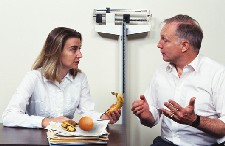Eating three or more servings of fruit per day may significantly decrease the risk of developing neovascular age-related macular degeneration (AMD), though neither vegetables, antioxidant vitamins nor carotenoids may decrease either form of the disease, says a study published in the June Archives of Ophthalmology.
Researchers at Brigham and Womens Hospital, in Boston, followed the diets of 77,562 women for 18 years and 40,866 men for 12 years. The participants were at least 50 years old and had no prior diagnosis of cancer or any form of AMD at baseline.
Dietary and vitamin intakes were assessed via a semiquantitative food-frequency questionnaire, given to the women five separate years and to the men three separate years.
Over the period of time recorded, 329 women and 135 men were diagnosed with early AMD (based on the presence of drusen or retinal pigment epithelial changes), while 217 women and 99 men were diagnosed with neovascular AMD (based on retinal pigment epithelial detachment, choroidal neovascular membrane or disciform scar). Among all participants, the absolute intake categories showed that those who consumed three or more servings of fruit per day were 36% more likely not to develop neovascular AMD than those who consumed less than 1.5 servings per day. Higher intakes of bananas and oranges showed a statistical significance.

Three fruits a day keeps the AMD away.
Meanwhile, vegetables, carotenoids and antioxidant vitamins were not strongly related to decreasing either form of the disease.
Researchers may have found more clear-cut relationships between early AMD, vegetables and carotenoids had they expanded their definition of AMD to include visual functional deficits such as glare recovery difficulty and deficits in retinal contrast sensitivity, says Stuart Richer, O.D., Ph.D., commenting on the study. Spinach, for instance, demonstrated a non-statistically significant near trend decrease for early AMD risk. Dr. Richer is associate professor of family and preventative medicine at the Rosalind Franklin University of Medicine and Science in North Chicago.
As for the vitamin aspect, Dr. Richer says that while he is not surprised that nutrients aside from lutein and vitamin E in men, and carotenoid B-crptoxanthin in both genders, failed to show an individual effect (the same data were reported in the Australian Blue Mountains Eye Study), he does have a problem with the fact that the authors only discussed pooled relative risk values, because there are differences between men and women in the distribution of fat-soluble vitamins.
Still, he says, the fact that fruit intake may decrease the risk for neovascular AMD is a significant finding, and we as practitioners should inform vulnerable patients that increasing fruit consumptionparticularly oranges and bananasmay be helpful.
Cho E, Seddon JM, Rosner B, et al. Prospective study of intake of fruits, vegetables, vitamins, and carotenoids and risk of age-related maculopathy. Arch Ophthalmol 2004 Jun;122(6):883-92.

